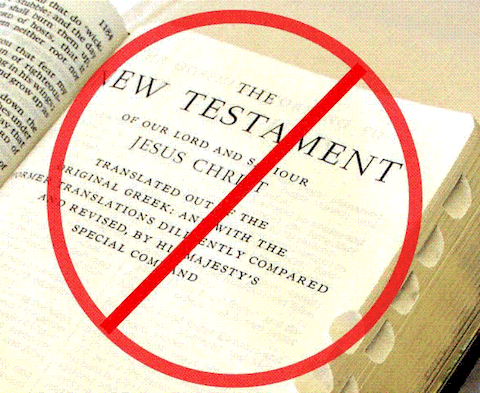
1001 Errors in the Christian Bible
Home
Dedication
Matthew
Mark
Luke
John
Acts
Contact Us
John -- Errors 530-536
#530
John 3: (KJV)
34 “For he whom God hath sent speaketh the words of God: for God
giveth not the Spirit by measure unto him.”
The Greek also has a “the” before the second use of “God”.
# 531
John 3: (KJV)
36 “He that believeth on the Son hath everlasting life: and he
that believeth not the Son shall not see life; but the wrath of God abideth
on him.”
KJV has mistranslated the second “believeth”, it should be “obeyeth”,
but a majority of moderns get it right. The sentiment though of one of
the most important themes of the Christian Bible, reward only comes through
Jesus, is contradicted by one of the most important themes of the Tanakh
illustrated for example by Jeremiah 17: (KJV)
10 “I the LORD search the heart, I try the reins, even to give
every man according to his ways, and according to the fruit of his doings.”
# 532
John 4: (KJV)
1 “When therefore the LORD knew how the Pharisees had heard that
Jesus made and baptized more disciples than John,
2 (Though Jesus himself baptized not, but his disciples,)”
Compare to John 3: (KJV)
22 “After these things came Jesus and his disciples into the land
of Judaea; and there he tarried with them, and baptized.”
John 4:’s Jesus did not baptize but John 3:’s Jesus did.
# 533
John 4: (KJV)
5 “Then cometh he to a city of Samaria, which is called Sychar,
near to the parcel of ground that Jacob gave to his son Joseph.”
The town in the Tanakh was “Shechem” and not “Sychar”.
There is no evidence that there ever was a “Sychar” in Samaria.
# 534
John 4: (KJV)
6 “Now Jacob's well was there. Jesus therefore, being wearied
with his journey, sat thus on the well: and it was about the sixth hour.”
The Greek literally says “on the well” so KJV has translated
correctly. A majority of moderns though avoid “on” and say something
to the effect of “by” or “at”. Since “wells”
are generally thought to consist mainly of the shaft and pool of water
at the bottom it sounds funny to say someone would be sitting on this.
# 535
John 4: (KJV)
25 “The woman saith unto him, I know that Messias cometh, which
is called Christ: when he is come, he will tell us all things.”
“Christ” above should be “anointed” as the underlying
Greek word means “anointed”. In the verse the woman cannot be
using the Greek word as a name because she doesn’t even know who
Jesus is for Christ’s sake. She also is not using the Greek word
as a title because there is no definite article (as in “the Christ”)
before the Greek word. The best translation is that she is giving the
meaning of the Hebrew “Messiah” which is “anointed”.
It’s unlikely that “which is called anointed” or “the
one being called anointed” is an editorial comment as the “when
he is come” should be “when that one is come” and this
qualification (“that one”) supports the entire phrase as the
woman’s (Young’s correctly translates “that one”).
All modern translations I’ve seen use “Christ” here.
# 536
John 4: (KJV)
29 “Come, see a man, which told me all things that ever I did:
is not this the Christ?”
The underlying Greek word for “Christ” is “anointed”.
The English word “Christ” is generally associated with a specific
individual and used as a name. As the woman is using the definite article
and it’s unlikely at the time of the supposed story that Jesus was
called “Jesus Christ” “anointed” is a better translation.